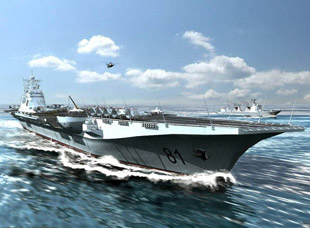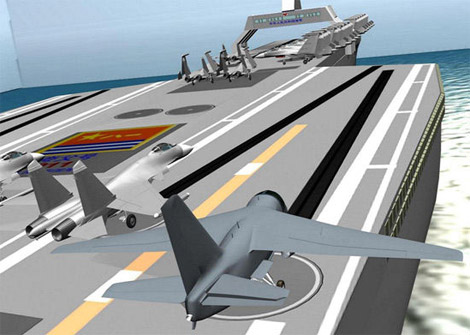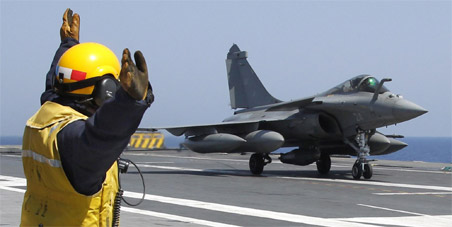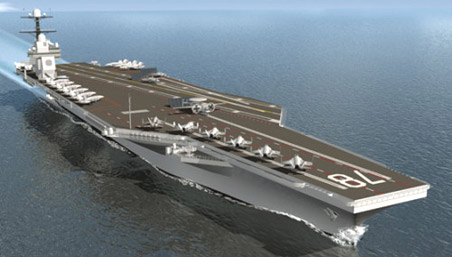What does China's first aircraft carrier mean?
Updated:2012-09-25 15:41
(chinadaily.com.cn)
|
Aircraft carriers around the world |
|
Despite the huge cost of carriers, navies around the world are striving to add new ones to their inventories at a pace unseen since World War II. |
|
Country |
Number |
Introduction |
| 11 |
USS Enterprise (CVN-65): 93,500 ton nuclear-powered supercarrier commissioned in 1961. First nuclear-powered aircraft carrier. Scheduled for decommissioning in 2013, may be extended to 2014–2015. Nimitz class: ten 101,000 ton nuclear-powered supercarriers, the first of which was commissioned in 1975. A Nimitz class carrier is powered by two nuclear reactors and four steam turbines and is 1,092 feet (333 m) long. |
|
| 1 |
HMS Illustrious: 22,000 ton STOVL carrier, commissioned in 1982. Originally there were three of her class but the other two have since been retired. |
|
| 1 |
Charles de Gaulle (R 91): 42,000 ton nuclear-powered aircraft carrier, commissioned in 2001. |
|
| 1 |
Admiral Flota Sovetskovo Soyuza Kuznetsov: 67,500 ton Kuznetsov class STOBAR aircraft carrier. Launched in 1985 as Tbilisi, renamed and operational from 1995. |
|
| 1 |
NAe São Paulo (A12): 32,800 ton ex-French carrier FS Foch (launched 1960), purchased in 2000. |
|
| 1 |
INS Viraat: 28,700 ton ex-British carrier HMS Hermes (launched 1953), purchased in 1986 and commissioned in 1987, scheduled to be decommissioned in 2019. |
|
| 2 |
Giuseppe Garibaldi (551): 14,000 ton Italian STOVL carrier, commissioned in 1985. Cavour (550): 27,000 ton Italian STOVL carrier, commissioned in 2008. |
|
| 2 |
Principe de Asturias (R11): 17,200 ton STOVL carrier, commissioned in 1988. Juan Carlos I (L61): 27,000 ton, launched in 2008, commissioned 30 September 2010. |
|
| 1 |
HTMS Chakri Naruebet: 11,400 ton carrier based on Spanish Principe De Asturias design. Commissioned in 1997. |

|
Analysis & Opinions |
|
What does China's first aircraft carrier mean? Such a launch would be the first, exploratory step toward an operational carrier fleet, said the Philippine Daily Inquirer on July 13. National Defense University professor Han Xudong said for China from the construction of destroyers to aircraft carriers is a leap forward. Wang Haiyun, the senior adviser for the China International Institute for Strategic Society said "China pursues a defensive military strategy, for quite a long time China's aircraft carrier will be mainly used for coastal defense and maintaining security and stability in the Taiwan Straits." |
The function of China's carrier
 Wang Baokun, an associate professor at Renmin University of China, says aircraft carriers can be used as strategic deterrence and to thwart outside interference in regional affairs. |
How many carriers does China need to deploy? In regards to China and the number and deployment of aircraft carriers, Wang Haiyun said that the South China Sea and East China needed aircraft carriers. "From this perspective, three to five are still needed." Du Wenlong said China should at least ensure that there are three aircraft carriers in service to have the effective capability of combat - one for war, one for training, one in maintenance. So if something happens, there is at least one carrier that can be timely deployed. He said China should at least have two aircraft carrier battle groups in order to address some of the moderate scale operations. |
|
 An artist depiction of China's aircraft carrier Liaoning. [Photo/File photo]
|
Liang Guanglie --- Defense Minister China cannot be without aircraft carriers forever, especially because of the increasing power struggle in the international arena. Chen Bingde --- Chief of the PLA General Staff China is a big country and we have quite a large number of ships, but they are only small ships, this is not commensurate with the status of a country like China. Wu Xinbo --- International relations professor China wants to build an aircraft carrier largely to defend international shipping lanes, which Beijing considers crucial to its economy. Wang Baokun --- Associate professor at Renmin University China needs aircraft carriers because they are important for cooperation as well as a counterbalancing force among the big powers. |
|
Aircraft carrier - a symbol of navy power |
|
An aircraft carrier is a warship designed with a primary mission of deploying and recovering aircraft, acting as a seagoing airbase. Aircraft carriers thus allow a naval force to project air power worldwide without having to depend on local bases for staging aircraft operations. They have evolved from wooden vessels, used to deploy balloons, into nuclear-powered warships that carry dozens of fixed- and rotary-wing aircraft. Of the nine nations which possess an aircraft carrier, six of these navies only possess one such ship. There are 20 active aircraft carriers in the world as of June 2011. |
Launch and recovery of aircraft
 |
|
 |
Cost of building aircraft carrier According to the United States Government Accounting Office (GAO), a nuclear-powered aircraft carrier cost about 58 percent more than a conventionally powered carrier. In their report, the average life-cycle costs in fiscal year 1997 dollars for the Nimitz carriers are as follows: Construction costs - $4.5 billion Mid-life overhaul costs - $2.3 billion Operating and support costs - $14 billion Other costs - $1 billion Total average cost - $22 billion each |
![]()
|
A close-up view of Liaoning |